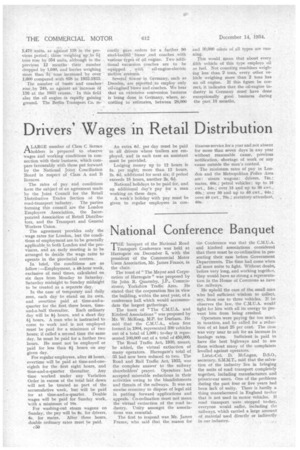Drivers' Wages in Retail Distribution
Page 104

If you've noticed an error in this article please click here to report it so we can fix it.
ALARGE number of Class C licence holders is prepared to observe wages and working conditions in connection with their business, which compare favourably with those put forward by the National Joint Conciliation Board in respect of Class A and B licences.
. The rates of pay and conditions form the subject of an agreement made by the Joint Council for the Retail Distributive Trades Section of the road-transport industry. The parties forming this council are the London Employers Association, the Incorporated Association of Retail Distributors, and the Transport and General Workers Union.
The agreement provides only the wage rates for London, but the conditions of employment are to be generally applicable to both London and the provinces, and an early meeting is to be arranged to decide the wage rates to operate in the provincial centres.
In brief, the conditions are as follow : —Employment, a 48-hour week, exclusive of meal times, calculated on six days from Monday to Saturday. Saturday midnight to Sunday midnight to be treated as a separate day.
In the case of temporary and daily men, each day to stand on its own, and overtime paid at time-and-a quarter for the first three hours, timeand-a-half thereafter. Each ordinary day will be 8i hours, and a short day 51 hours. A man who is instructed to come to work and is not employed must be paid for a minimum of two hours; if called a second time the same day, he must be paid for a further two hours. He must not be employed or paid for less than 8i hours on any given day.
For regular employees, after 48 hours, overtime will be paid at time-and-one eighth for the first eight hours, and time-and-a-quarter thereafter. Any time worked under any Variation Order in excess of the total laid down will not be treated as part of the accumulative week, but will be paid for at time-and-a-quarter. Double wages will be paid for Sunday work, with a minimum of 10s.
For washing-out steam wagons on Sunday, the pay will be 8s. for drivers, 6s. for mates. After three hours, double ordinary rates must be paid.
c50 An extra 6d. per day must be paid to all drivers where trailers are employed, and in each case an assistant must be provided.
Lodging money up to 12 hours is 5s. per night; more than 12 hours, 2s. 6d. additional for next six; if period exceeds 18 hours, another 2s. 6d.
National holidays to be paid for, and an additional day's pay for a man working on these days.
A week's holiday with pay must be given to regular employees in con tinuous service for a year and.not absent for more than seven days in any year without reasonable cause, previous notification, shortage of work or any cause outside the man's control.
The minimum rates of pay in London and the Metropolitan Police Area are: steam wagons: drivers, 74s.; mates, 60s.; petrol vehicles: up to 15 cwt., 54s.; over 15 and up to 30 cwt., 60s.; over 30 and uP to 40 cwt., 64s.; over 40 cwt., 70s.; statutory attendant, 60s.




































































































































































